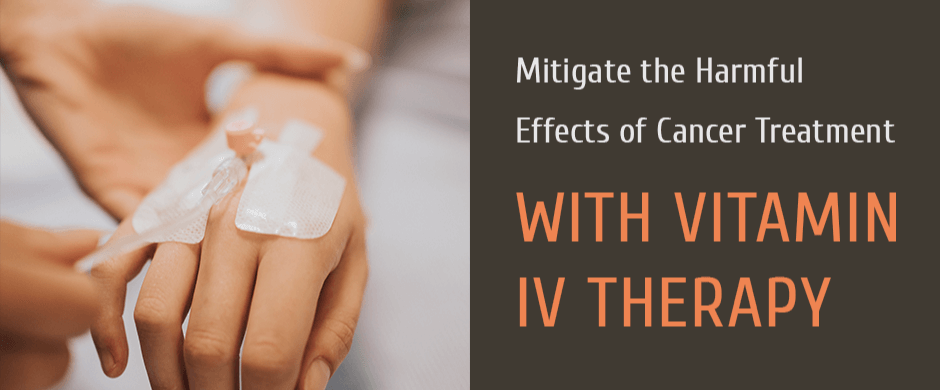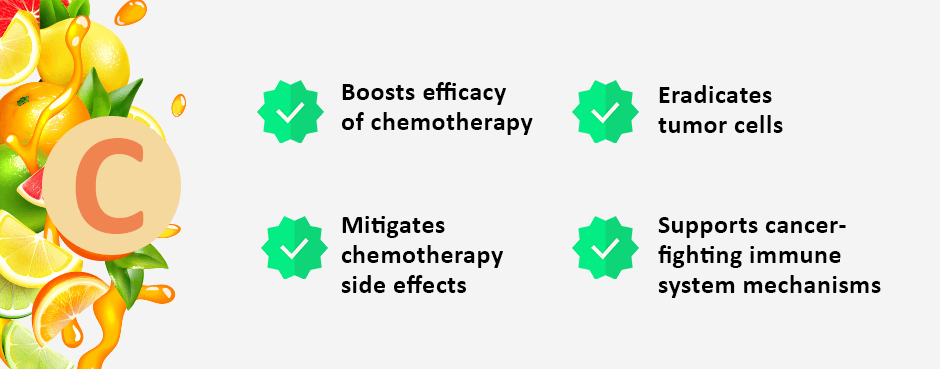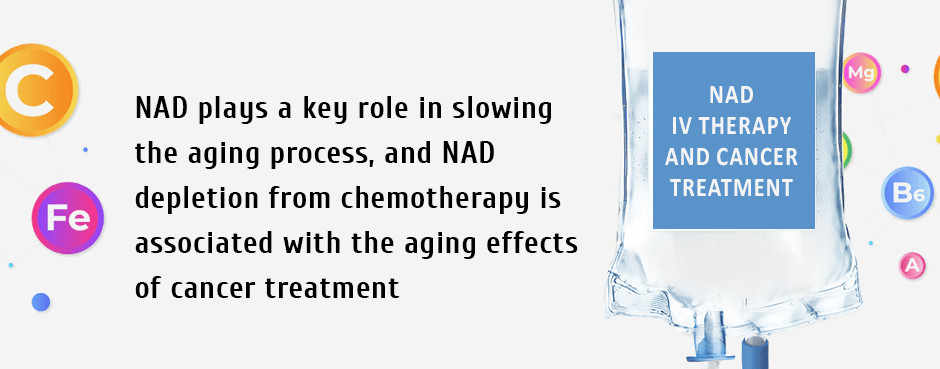
Being diagnosed with cancer is a terrifying experience, with difficult choices to be made for treatment options. Many traditional cancer treatments like chemotherapy cause massive harm to healthy tissues while targeting diseased cells. Nutrient therapy with high-dose Vitamin C IV and NAD IV therapy, can help offset cancer treatment’s negative effects, and replenish NAD levels that are vital to human health.
High Dosage Vitamin C for Cancer Treatment
Cancer is a serious disease that requires early and aggressive treatment. Chemotherapy has traditionally been the primary standard-of-care for cancer treatment, despite its well-documented harmful side effects on healthy tissues.
Advances in cellular biology research have given us a window into the exact mechanisms of chemotherapy that pose a threat to healthy cells, and insight into therapeutic approaches that can help mitigate chemo’s deleterious effects.
Vitamin C is a potent antioxidant vitamin that plays a vital role in multiple metabolic processes. It supports the immune system and plays a protective role in cellular metabolism. As a cofactor in a variety of enzyme reactions, Vitamin C plays an important role in the synthesis of collagen, production of norepinephrine and the absorption of iron.
The idea of treating cancer patients with Vitamin C was first introduced in the 1970s by award-winning chemist Linus Pauling and Dr. Ewan Cameron. Pauling and Cameron published multiple scientific reports demonstrating that high-dose intravenous Vitamin C therapy significantly improved the survival rates of patients with terminal cancer.

High dose Vitamin C benefits in the treatment of cancer include:
- Boosts efficacy of chemotherapy
- Mitigates chemotherapy side effects
- Eradicates tumor cells
- Supports cancer-fighting immune system mechanisms
Extensive research indicates that oral Vitamin C supplements, even in high doses, do not have the same effect or benefits as intravenous Vitamin C therapy. Hence, studies based on oral Vitamin C therapy only do not demonstrate its true benefits. When delivered intravenously, high doses of Vitamin C produce plasma concentrations 30 to 70 times greater than maximum tolerated oral doses.
NAD IV Therapy and Cancer Treatment
One critical side effect of chemotherapy is damage to cellular mitochondria. Mitochondria are organelles that serve as “energy factories” in every cell, where oxygen is used to convert fat and glucose into ATP, the energy molecule.
Nicotinamide adenine dinucleotide (NAD) is a vital coenzyme that influences multiple key cellular functions. It plays a critical role in DNA repair, and is essential to mitochondrial function. Harmful side effects of chemotherapy include damage to DNA and cellular mitochondria, and severe depletion of NAD levels.

NAD plays a key role in slowing the aging process, and NAD depletion from chemotherapy is associated with the aging effects of cancer treatment. Replenishing NAD levels can be a crucial step in mitigating the negative effects of chemotherapy.
As with Vitamin C, NAD is best absorbed and utilized when delivered intravenously. NAD IV therapy and high-dose Vitamin C IV therapy deliver nutrients directly to the bloodstream, bypassing the gastrointestinal tract. Since nausea, vomiting and diarrhea are common side effects of chemotherapy, intravenous delivery avoids further upsetting the digestive system and ensures that the nutrients are delivered with their potency intact.
Anti-Cancer IV Therapy in NYC
Nutritional support is essential for human health, especially when cancer cells invade the human body. Having adequate doses of the right nutrients can help determine the success of treatment and the time spent in recovery. Because Vitamin C and NAD are vital water-soluble nutrients and not drugs, they have no negative side effects and pose zero risk to human health. NAD IV treatment and high-dose Vitamin C IV therapy do not require a doctor’s prescription.
If you are being treated for cancer and want to offset the negative side effects of chemo, or if you want to optimize your health post-cancer treatment, contact InVita Wellness in Midtown Manhattan today, and give your body the nutrients it needs to fight cancer at the cellular level.
Resources
Böttger, Franziska, et al. “High-dose intravenous vitamin C, a promising multi-targeting agent in the treatment of cancer.” Journal of Experimental & Clinical Cancer Research 40.1 (2021): 1-44.
Padayatty, Sebastian J., et al. “Vitamin C pharmacokinetics: implications for oral and intravenous use.” Annals of internal medicine 140.7 (2004): 533-537.